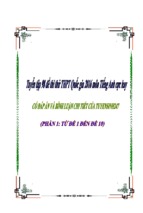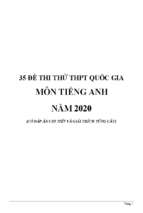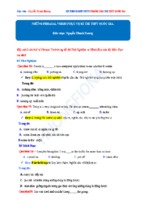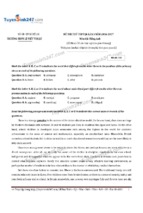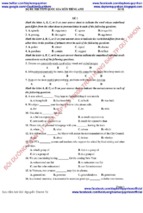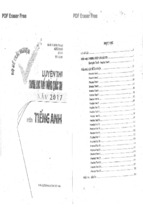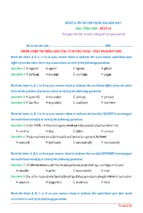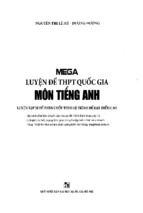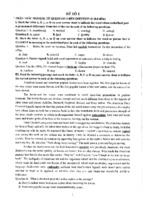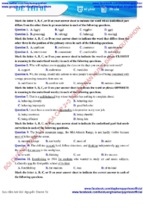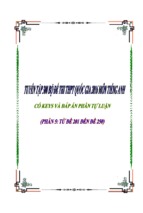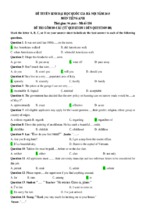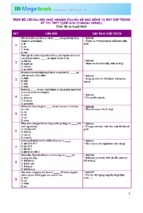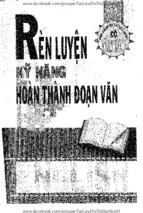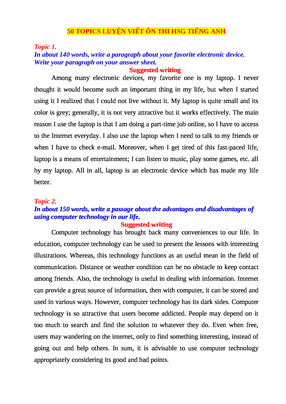ĐỀ THI THỬ SỐ 31
ĐỀ THI THỬ ĐẠI HỌC NĂM 2013
Môn: TIẾNG ANH; Khối D
Thời gian làm bài: 90 phút, không kể thời gian phát đề
ĐỀ THI GỒM 80 CÂU (TỪ QUESTION 1 ĐẾN QUESTION 80)
I. Mark the letter A, B, C, or D on your answer sheet to indicate the word whose main stress is
placed differently from that of the rest in each of the following questions.
Question 1
A. assistant
B. holiday
C. colony
D. possible
Question 2
A. faithfully
B. sincerely
C. completely
D. extremely
Question 3
A. recognize
B. contaminate
C. orphanage
D. infrastructure
Question 4
A. survival
B. wilderness
C. dependent
D. intention
Question 5
A. composer
B. artistic
C. funeral
D. musician
II. Choose the word whose underlined part is pronounced differently from that of the other
words.
Question 6:
A. merchant
B. sergeant
C. commercial
D. term
Question 7:
A. colonel
B. journal
C. touring
D. adjourn
Question 8:
A. examine
B. famine
C. determine
D. miner
Question 9:
A. descend
B. decent
C. delicious
D. percentage
Question 10:
A. knowledge
B. flower
C. shower
D. coward
III. Mark the letter A, B, C, or D to indicate the correct answer to each of the following
questions.
Question 11: My clothes are not in the room. They _________ them away.
A. took
B. have taken
C. had taken
D. will take
Question 12: The bicycle he lent me badly needed ______ .
A. to clean
B. clean
C. to be cleaning
D. cleaning
Question 13: If you had done as I told you, I think you _________ .
A. would succeed
B. would have succeeded
C. could succeed
D. had succeeded
Question 14: What would happen if our environment __________ ?
A. polluted
B. were polluted
C. is being polluted
D. is polluted
Question 15: Anyone _____ must apply before next Friday.
A. who are interested in the job
B. who is interested in the job
C. who are interesting in the job
D. whose job is interested
Question 16: Do you know a restaurant _________ ?
A. that we have a good meal
B. which we have a good meal
C. where we can have a good meal
D. what we can have a good meal
Question 17: I remembered __________ a letter a few days before going on holiday.
A. to receive
B. to have received
C. received
D. receiving
Question 18: My father _______ to the Golf Club for the past 25 years.
A. was belonging
B. has belonged
C. has been belonged
D. has belonging
Question 19: The girls and flowers __________ he painted were vivid.
A. who
B. which
C. whose
D. that
Question 20: All night long people dance and sing. They do it _______ .
A. during the whole night
B. in all the night
C. the night long
D. in the night
Question 21: After he ______ work, he went straight home.
A. had finished
B. had been finishing
C. has finished
D. would finish
Question 22: Thank you for reminding me _______ the tickets. I almost forgot it.
A. to bring
B. bringing
C. to bringing
D. of bringing
Question 23: "I can’t see the stage very well from here." “________.”
A. Neither can’t I
B. Neither I can
C. I can’t neither
D. Neither can I
Question 24: The only person ______ the crime was killed in an accident this morning.
A. to witness
B. witnessed
C. witness
D. witnessing
Question 25: He’d prefer ______ chicken soup rather than ______ milk.
A. having / having
B. to have / drink
C. have / drink
D. had / drank
Question 26: It sounds incredible; It's true _____.
A. yet
B. though
C. although
D. because
Question 27: He just can't _____ without cigarettes.
A. make
B. do
C. pass
D. go
Question 28: A : "A motorbike knocked Ted down." B : "______. "
A. What is it now?
B. What a motorbike!
C. How terrific!
D. Poor Ted!
Question 29: The workers voted in favour of a (n) ___________ strike.
A. interminable
B. endless
C. ceaseless
D. indefinite
Question 30: Not until _____ home _______ that he had taken someone else's bike.
A. did he get/ he realised
B. he got/ did he realise
C. he got/ he realised
D. he got/ he did realised
Question 31: One condition of this job is that you must be _____ to work at weekends.
A. acceptable
B. available
C. accessible
D. capable
Question 32: Ken ______ his doctor's advice and continued to overwork.
A. disregarded
B. disassociated
C. disowned
D. disappointed
Question 33: We don't allow ____________ in the classroom.
A. people smoke
B. smoke
C. people to smoke
D. to smoking
Question 34: It is vital that we _______ a change in people's attitude.
A. bring down
B. bring back
C. bring about
D. bring away
Question 35: She resented ________ waiting for hours in front of the cinema.
A. to be kept
B. keeping
C. being kept
D. being keeping
Question 36: Small pox and diphtheria disappeared in Britain many years ago, _______ cancer,
AIDS and heart disease are now predominant.
A. because
B. in the event that
C. in case
D. whereas
Question 37: We haven't seen ________ for ten years. I did wonder where you were.
A. one other
B. each other
C. together
D. the others
Question 38: I___________ three rooms of the house so far today; I'll do the other two this
afternoon.
A. has been cleaning
B. cleaned
C. are cleaning
D. have cleaned
Question 39: Come and have a _________ at this insect. It is strange, isn't it?
A. go
B. difficulty
C. look
D. try
Question 40: Everybody should comply __________ this rule. There is no exception, I am
afraid.
A. to
B. for
C. with
D. in
IV. Mark the letter A, B, C, or D on your answer sheet to indicate the sentence that is closest
in meaning to each of the following questions.
Question 41: If it hadn’t been for his carelessness, we would have finished the work.
A. He was careless because he hadn’t finished the work.
B. If he were careful, we would finish the work.
C. If he had been more careful, we would have completed the work.
D. Because he wasn’t careless, we didn’t finish the work.
Question 42: The hostess made every effort to see that her guests got the food and drinks they
wanted.
A. The hostess was reluctant to offer her guests food and drinks.
B. The hostess tried hard to please her guests.
C. The guests refused the food and drinks prepared by the hostess.
D. Neither the guests nor the hostess had food or drinks.
Question 43: Most people get fewer colds in the summer than in the winter.
A. A person is more likely to get a cold in the winter than in the summer.
B. More people have summer colds than winter colds.
C. People get colder in the summer than in the winter.
D. The winter is much colder than the summer.
Question 44: He told her, “Your dress looks dirty. Why didn’t you wash it?”
A. He told her that her dress looked dirty and asked why she didn’t wash it.
B. He told her that her dress looks dirty and asked why she didn’t wash it.
C. He told her that her dress looked dirty and asked why she hadn’t wash it.
D. He told her that her dress looked dirty and asked why she hadn’t washed it.
Question 45: “Come in. I am very glad that you come,” he told them.
A. He told them to come in and said that he is very glad that you come.
B. He told them to come in and said that he was very glad that you come.
C. He told them to come in and said that he is very glad that they come.
D. He told them to come in and said that he was very glad that they came.
V. Mark the letter A, B, C, or D to show the underlined part that needs correction in each of
the following questions.
Question 46: In spite of (A) my father is old (B), he still goes (C) to work (D).
A
B
C
D
Question 47: The result (A) of that test must be (B) inform (C) before (D) August.
A
B
C
D
Question 48: The Charles Dickens’s character (A) Wilkins Micawber lived (B) in optimistic (C)
expectation of a best fortune (D).
A
B
C
D
Question 49: Mrs. Steven, along with (A) her cousins (B) from New Mexico, are (C) planning to
attend (D) the festivities.
A
B
C
D
Question 50: As soon as we’ve (A) finished supper (B), we’ll all (C) go to (D) downtown to see
our friends.
A
B
C
D
VI. Read the following passage and mark the letter A, B, C, or D to indicate the correct word
for each of the questions from 51 to 55 .
In the United States and Canada, it is very important to look a person in the eyes when you are
having a conversation with him or her. If you look down or to the side when the other person is
talking, that person will think that you are not interested in what he or she is saying. This of
course, is not polite. If you look down or to the side when you are talking, you may appear
hiding something, that is, it might seem that you are not honest. However, people who are
speaking will sometimes look away for a few seconds when they are thinking of or trying to find
the right word. But they always turn immediately back to look the listener in the eyes. These
social rules are the same for two women, two men, a woman and a man or an adult and a child.
Question 51: When you are talking to an American or Canadian, you should ________.
A. look to the side
B. look down
C. avoid looking directly at him/ her
D. look directly at him/ her
Question 52: It is very _______ of you not to look in the eyes of the listener while talking.
A. polite
B. nice
C. honest
D. dishonest
Question 53: Looking down or to the side when the other person is talking means ________.
A. you feel bored with his/ her words
B. you respect of him/ her
C. you are paying attention to her/ him
D. you are afraid of him/ her
Question 54: People can look away for a few seconds while speaking ________.
A. to find the correct word
B. to hide something
C. to hide their feelings
D. to find something
Question 55: These social rules are used for ________.
A. a man and a woman
B. two women
C. two men
D. everybody
VII. Read the following passage and mark the letter A, B, C, or D to indicate the correct word
for each of the questions from 56 to 60 .
Language, the way we express ourselves, is a vital part of learning. A baby learns his native
tongue naturally by hearing speech around him. If the speech he hears is rapid, not clear and
never directed at him then he learns slowly and speaks badly. A child of two or three who can’t
make his desires known or put his thoughts into words will usually become angry. His
relationships with other get worse. If the speech a baby hears around him is clear, and his family
talk to him, he will gain a satisfactory command of language directly, by his mother, his language
ability will be greater. By the time he is two, it is quite possible for him to have a vocabulary of
two thousand words and by the time he is three he will be able to read. Once ahead he will stay
ahead.
Question 56: How is language defined by the writer?
A. Language is the way we express ourselves
B. Language is what we learn
C. Language is what we say
D. Language is what we write
Question 57: How does a baby learn his mother tongue?
A. by listening to radio
B. by reading books
C. by hearing what is said around him
D. watching TV
Question 58: How does the child usually react when he can’t express himself?
A. He will get worse
B. He will get angry
C. He won’t talk
D. He will be better
Question 59: How should the mother talk to her baby?
A. clearly, directly
B. clearly, indirectly
C. rapidly, clearly
D. slowly, indirectly
Question 60: How many words does a baby at the age of two can acquire?
A. 20 words
B. 200 words
C. 2,000 words
D. 20, 000 words
VIII. Read the following passage and mark the letter A, B, C, or D on your answer sheet to
indicate the correct answer for each of the blanks from 61 to 70.
The new British Library.
Originally commissioned years ago, the new British Library was supposed to open in 1990.
However, the project has been (61)____ by political infighting, poor planning and financial
problems. The most recent (62) ____came in June when inspectors discovered that 60 miles of
new metal shelving had started to rust and needs to be (63) _____. That would (64) _____ the
opening of the project’s first phase for another two years. “Things has gone from bad to worse.”
Said Brian Lake, secretary of the Regular Readers, an association of writers and scholars who are
not happy with plans for the new library. “It is a grand national project that has become a great
national scandal.”
It sounded like a splendid idea when the government unveiled its $164 million project in
1978. Sophisticated elctronic (65) _____ would help and keep the library’s irreplaceable stock at
an optimal (66) ______ and humidity. A computer-controlled delivery system would provide
books to readers within minutes of a (67) ______ rather than days. And to (68) ______ other
needs of the reading public, the library would also include exhibition galleries, a restaurant and a
conference hall.
That was the plan, anyway the start of construction was delayed until 1982 by arguments
about planning and by a (69) ______ of government. Four years later, members of cabinet
ordered a progress report and discovered that the committee who were responsible for (70)
______ the project hadn’t met in four years.
Question 61:
A. delayed
B. bothered
C. infected
D. restricted
Question 62:
A. comeback
B. setback
C. drawback
D. cutback
Question 63:
A. substituted
B. replaced
C. abandoned
D. rejected
Question 64:
A. distract
B. destroyed
C. postpone
D. postdate
Question 65:
A. items
B. computers
C. equipment
D. tools
Question 66:
A. heat
B. temperature
C. cold
D. warmth
Question 67:
A. reservation
B. demand
C. wish
D. request
Question 68:
A. fit
B. serve
C. bring
D. obey
Question 69:
A. variation
B. difference
C. shift
D. change
Question 70:
A. guarding
B. supervising
C. overlooking
D. watching
IX. Read the following passage and mark the letter A, B, C, or D on your answer sheet to
indicate the correct answer to each of the questions from 71 to 80.
A number of factors related to the voice reveal the personality of the speaker.
The first is the broad area of communication, which includes imparting information by use
of language, communicating with a group or an individual and specialized communication
through performance. A person conveys thoughts and ideas through choice of words, by a tone of
voice that is pleasant or unpleasant, gentle or harsh, by the rhythm that is inherent within the
language itself, and by speech rhythms that are flowing and regular or uneven and hesitant, and
finally, by the pitch and melody of the utterance. When speaking before a group, a person's tone
may indicate uncertainty or fright, confidence or calm. At interpersonal levels, the tone may
reflect ideas and feelings over and above the words chosen, or may believe them. Here the
participant’s tone can consciously or unconsciously reflect intuitive sympathy or antipathy, lack
of concern or interest, fatigue, anxiety, enthusiasm or excitement, all of which are .usually
discernible by the acute listener. Public performance is a manner of communication that is highly
specialized with its own techniques for obtaining effects by voice and /or gesture. The
motivation derived from the text, and in the case of singing, the music, in combination with the
performer's skills, personality, and ability to create empathy will determine the success of
artistic, political, or pedagogic communication.
Second, the voice gives psychological clues to a person's self-image, perception of others,
and emotional health. Self-image can be indicated by a tone of voice that is confident,
pretentious, shy, aggressive, outgoing, or exuberant, to name only a few personality traits. Also
the sound may give a clue to the facade or mask of that person, for example, a shy person hiding
behind an overconfident front. How a speaker perceives the listener's receptiveness, interest, or
sympathy in any given conversation can drastically alter the tone of presentation, by
encouraging or discouraging the speaker. Emotional health is evidenced in the voice by free and
melodic sounds of the happy, by constricted and harsh sound of the angry, and by dull and
lethargic qualities of the depressed.
Question 71: What does the passage mainly discuss?
A. The function of the voice in performance
B. Communication styles
C. The connection between voice and personality
D. The production of speech
Question 72: What does the author mean by staring that, "At interpersonal levels, tone may
reflect ideas and feelings over and above the words chosen" in lines 6?
A. Feelings are expressed with different words than ideas are.
B. The tone of voice can carry information beyond the meaning of words.
C. A high tone of voice reflects an emotional communication.
D. Feelings are more difficult to express than ideas.
Question 73: The word "Here" in line 6 refers to _____________.
A. interpersonal interactions
B. the tone
C. ideas and feelings
D. words chosen
Question 74: The word "derived" in line 13 is closest in meaning to ____________.
A. discussed
B. prepared
C. registered
D. obtained
Question 75: Why does the author mention "artistic, political, or pedagogic communication" in
line 10?
A. As examples of public performance
B. As examples of basic styles of communication
C. To contrast them to singing
D. To introduce the idea of self-image
Question 76: According to the passage, an exuberant tone of voice may be an indication of a
person's _______.
A. general physical health
B. personality
C. ability to communicate
D. vocal quality
Question 77: According to the passage, an overconfident front may hide _______.
A. hostility
B. shyness
C. friendliness
D. strength
Question 78: The word "drastically" in line 14 is closest in meaning to ____________.
A. frequently
B. exactly
C. severely
D. easily
Question 79: The word "evidenced" in line 15 is closest in meaning to ________.
A. questioned
B. repeated
C. indicated
D. exaggerated
Question 80: According to the passage, what does a constricted and harsh voice indicate?
A. Lethargy
B. Depression
C. Boredom
D. Anger
---------- THE END ----------
- Xem thêm -


